Do you have a question about the Panasonic VIERA TX-P42S10B and is the answer not in the manual?
Enables reception of DVB digital terrestrial broadcasts.
Provides easy access to special features via VIERA TOOLS button.
Supports high definition signals via HDMI and Component Video inputs.
Enhances picture and sound quality using an HDMI cable.
Decodes Dolby Digital audio and outputs multi-channel sound.
Supports Gemstar-TV Guide for programme information.
An anti-theft function to identify the owner via PIN and personal info.
Supports SDHC cards for high storage capacity.
Allows playback of AVCHD format moving pictures recorded on SD Card.
View photos or movies recorded on SD Card on the TV screen.
Links and controls connected equipment for easy recording and home theatre setup.
Adds narration to describe on-screen events for visually-impaired viewers.
Important information before using the TV, including safety and notes.
Lists standard and optional accessories for the TV.
Identifies the various controls on the TV and remote.
Guides on connecting external equipment to the TV.
Steps for automatically searching and storing TV channels.
Covers fundamental TV operations and features.
Details advanced functionalities and settings.
Provides detailed technical data about the TV.
Solutions for common problems encountered with the TV.
Explains various messages displayed on the screen during operation.
Definitions of various technical terms used in the manual.
Lists the technical details and features of the TV.
Guidelines for safe handling and accessibility of the TV's power plug and lead.
Specifies the voltage and frequency requirements for the TV's power source.
Warns against removing the rear cover due to accessible live parts.
Instructions for safely transporting the TV to prevent internal damage.
Emphasizes the need for two or more people to handle the TV safely.
Advises against exposing the TV to direct sunlight or heat sources to prevent fire.
Warns that SD Cards are small objects and can be a choking hazard for children.
Advises against placing the TV on unstable surfaces to prevent tipping.
Critical safety information regarding the moulded mains plug and fuse.
Warns about potential "image retention" from displaying static images for extended periods.
Explains the automatic standby feature when no signal is received or operated.
Advises on keeping the TV away from certain electronic equipment to avoid interference.
Instructions for cleaning the TV's display panel safely and effectively.
Guidelines for cleaning the TV's cabinet and pedestal.
Instructions for cleaning the TV's mains plug to prevent fire or shock.
Lists all accessories included with the TV.
Information on optional accessories available for purchase.
Critical warnings related to disassembling or modifying the pedestal.
Precautions for using the pedestal to prevent damage or injury.
Step-by-step guide for assembling the TV pedestal.
Instructions for securely attaching the TV to the assembled pedestal.
Identifies the various input/output ports and slots on the TV.
Explains the function of the mains power switch and indicators.
Details the location and importance of the remote control signal receiver.
Explains the function and status indication of the Timer and Power LEDs.
Describes the function of the Contrast Automatic Tracking System (C.A.T.S.) sensor.
Controls for viewing media and managing TV standby status.
Buttons used for navigating menus and making selections.
Controls for channel selection, programme info, and input mode changes.
Buttons to access special features like VIERA Link and VIERA TOOLS.
Buttons for channel tuning, teletext, subtitles, sound, and volume control.
Diagram showing how to connect an aerial for TV-only reception.
Diagram showing connections for DVD Recorder/VCR.
Diagram for connecting multiple devices like recorders and satellite receivers.
Steps to connect the TV to power and initiate the auto setup.
Process for inputting the Owner ID for personalization and security.
Option to select the viewing environment (Home or Shop).
Explains how to navigate menus using the remote control.
Guide on using the on-screen help for operations like Owner ID entry.
Information on using the "Shop" mode for display purposes.
Shows how feature icons are displayed on screen.
Steps to select a specific feature from the VIERA TOOLS menu.
Guides on how to use features like VIERA Link Control and Slideshow.
Instructions for turning the TV on using the power button.
How to switch between DVB and Analogue TV reception modes.
Methods for selecting TV channels using numeric buttons or TV Guide.
Using the information banner to view programme details before changing channels.
Selecting channels by using the TV Guide (EPG).
Other functions like Hold for freezing pictures.
How to display or hide subtitles for DVB and Analogue modes.
Explains the information banner for programme details and features.
How the TV automatically adjusts aspect ratio based on signal.
Steps to manually change the picture aspect ratio.
Selecting preferred language for multi-audio and subtitles.
Adjusting volume and enabling audio description.
Setting the TV to turn off automatically after a specified period.
How to choose between DVB and Analogue channels in the TV Guide.
How to view programme schedules in Landscape or Portrait mode.
Moving between different days in the TV Guide.
Filtering channels by type or category in the TV Guide.
How to view advertisements within the TV Guide.
Selecting and watching a programme directly from the TV Guide.
Viewing programme details and setting timer recordings.
Recording programmes using timer programming from the TV Guide signal.
Introduction to DVB teletext services and their features.
How to access and use DVB teletext services.
Information on analogue teletext services and their features.
How to switch between FASTEXT and List modes for teletext.
Methods for navigating and selecting teletext pages.
Accessing the teletext index and managing subtitle settings.
How to store and recall frequently accessed teletext pages.
Viewing sub pages and watching TV while teletext updates.
Steps to turn on the TV and select the input source.
How to select the correct input mode for connected devices.
Displays the currently selected input mode.
Details the terminal configurations and default/auto input settings.
How to operate connected equipment using the TV remote.
Steps to change remote control codes for specific equipment.
How to access and navigate the main TV menus.
Steps to select, adjust, or configure menu options.
Different ways to interact with menu options and input data.
Details available settings within the Picture menu.
Details available settings within the Sound menu.
Settings related to connecting and configuring a PC.
Lists various setup options including Link Settings and Child Lock.
Options for tuning DVB and Analogue channels.
Functions for locking channels and creating favourite lists.
Managing channel lists for DVB and Analogue broadcasts.
Auto setup processes and checking signal conditions.
Different screen settings for various viewing scenarios.
Adjusting core picture quality parameters.
Settings for adjusting picture hue, color tone, and management.
Power saving mode and picture noise reduction settings.
Settings for 3D-COMB and resetting picture settings.
Selecting sound modes and adjusting bass/treble levels.
Adjusting speaker balance and headphone volume.
Configuring surround sound and volume correction.
Adjusting for speaker distance and selecting multi-audio languages.
Settings for NICAM stereo and HDMI input selection.
Settings for audio description and its volume.
Settings for timer programming, off timer, and VIERA Link.
Q-Link configuration and power saving settings.
Auto standby features and downloading analogue channel info.
Options for channel management, tuning, and setup.
Settings for teletext display modes and preferred subtitle languages.
Adjusting side panel brightness and labeling input terminals.
Configuring banner display duration and game playtime display.
Resetting settings and managing owner identification.
Managing CI modules, software updates, and system information.
Settings for picture enhancement, power on behavior, and screen display.
Step to select DVB mode for channel retuning.
Navigating to the main Setup menu.
Accessing the specific menu for DVB channel tuning.
Steps to perform automatic channel scanning for DVB.
Step to select Analogue mode for channel retuning.
Navigating to the main Setup menu.
Accessing the specific menu for Analogue channel tuning.
Steps to perform automatic channel scanning for Analogue.
Initial step to select DVB mode for channel management.
Navigating through menus to reach DVB tuning options.
Options for managing DVB channels like editing and updating.
Automatically updating the DVB channel list.
Setting notifications for newly found channels.
Assessing the quality and strength of DVB signals.
Steps to select and add channels to favourite lists.
Editing existing favourite channel lists.
Hiding or revealing unwanted DVB channels in the list.
Manually tuning DVB channels when auto setup fails.
Initial step to select Analogue mode for channel management.
Navigating through menus to reach Analogue tuning options.
Options for managing Analogue channels like editing and updating.
Hiding or revealing unwanted Analogue channels.
Editing existing analogue channel properties.
Manually tuning Analogue channels after auto setup.
Steps to access the Child Lock settings menu.
Setting up PIN and locking channels or inputs.
Procedures for entering and changing the Child Lock PIN.
Navigating to the input label settings.
Labeling or skipping input terminals for easier identification.
Using the on-screen keyboard to name input modes.
Navigating to the factory reset option.
Steps to initiate the factory reset process.
Confirming the reset and following on-screen prompts.
Navigating to the Owner ID settings.
Entering the PIN, name, address, and postcode.
Viewing stored personal information and changing the PIN.
Navigating to access advanced DVB settings.
Choosing from various advanced DVB related functions.
Instructions for inserting and using a Common Interface (CI) module.
How to access the Common Interface menu.
Downloading and installing new software for the TV.
Configuring automatic software updates.
How to access the menu for setting timer recordings.
Steps to set up timer programming for recording.
How to stop an ongoing recording.
Initial steps to begin setting timer programming.
Setting channel name, date, start/end times for recordings.
Storing, changing, or cancelling timer programming events.
Information on recording via TV Guide and direct TV recording.
Instructions for inserting and removing SD cards.
Accessing and viewing still images from an SD card.
Steps to select and view photos from the SD card.
How to start, pause, and resume a slideshow.
Adjusting background music, effects, interval, and repeat for slideshows.
Viewing all photos or sorting them by date/month.
Accessing and viewing video files from an SD card.
Steps to select and play movie files from the SD card.
Configuring audio output settings for movie playback.
Steps to turn on the TV and select the PC as the input source.
Adjusting various PC display settings via the TV menu.
Overview of features provided by Q-Link and VIERA Link.
Information on connecting equipment via SCART for Q-Link.
Details for connecting equipment via HDMI/SCART for VIERA Link.
Connecting equipment via HDMI and audio outputs for VIERA Link.
Information on controlling compatible equipment via VIERA Link.
Preparing for Q-Link and its features like channel download.
Recording programmes directly from the TV to a recorder.
Benefits of HDAVI Control for Panasonic products.
Steps to prepare for using VIERA Link, including connections.
List of features available with VIERA Link.
Enabling Standby Power Save for connected equipment.
Automatically putting unused equipment into standby.
Recording the current programme via VIERA Link menu.
How to pause and resume live TV programmes.
Controls for operating the pause live TV function.
Steps to stop pause mode and return to live TV.
Navigating and accessing the menu of connected equipment.
Using the TV remote to control connected devices.
Selecting and controlling speaker output.
Switching between Home Cinema and TV speaker modes.
Diagrams showing recommended connections for various equipment types.
Table showing equipment compatibility with TV terminals.
Specific connection details for camcorders, PCs, and headphones.
How the TV automatically selects the best aspect ratio.
Procedures for downloading and installing TV software updates.
Information on connecting devices via HDMI.
Pin layouts and details for AV1, AV2, AV3, and HDMI terminals.
Supported input signal formats for COMPONENT and HDMI.
Supported PC signal formats via D-sub and HDMI.
How to connect a PC and display its screen on the TV.
Important precautions for handling SD cards to prevent damage.
Supported data formats and using the character input table.
Solutions for noise, white spots, and S-Video picture issues.
Troubleshooting steps when there is no image or sound.
Resolving issues with the TV Guide and error messages.
Troubleshooting connection, Q-Link, and VIERA Link problems.
Solutions for image distortion, noise, and sound problems.
Addressing signal reception, tuning, and channel finding issues.
Troubleshooting HDMI connections, power on, and standby mode.
Resolving problems with the TV's remote control.
Explanations for messages related to tuning and setup.
Explanations for messages about features and operations.
Messages related to software updates and system time.
Messages concerning recording, signal reception, and PIN entry.
Explanations for messages related to recording and timer programming.
Messages related to SD card usage and file playback.
Definitions of various technical terms used in the manual.
An alphabetical list of topics and their corresponding page numbers.
Technical details on power, display size, and resolution.
Specifications for audio output, headphones, and PC signal inputs.
Details on the types and specifications of various connection terminals.
Specifications for output types, physical dimensions, and weight.
Contact information for customer support and service.
Information on purchasing accessories and extended warranties.
Regulatory compliance details and space for recording product information.
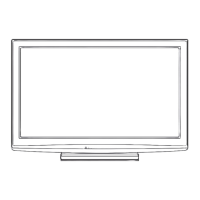
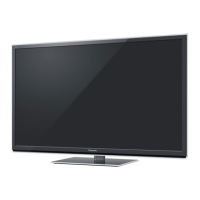
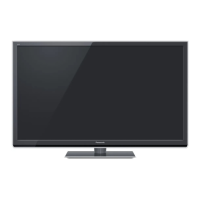

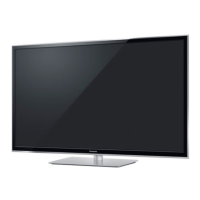
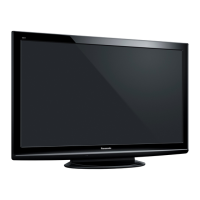


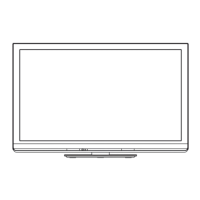
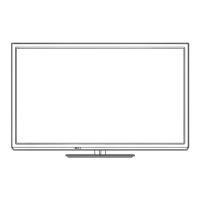

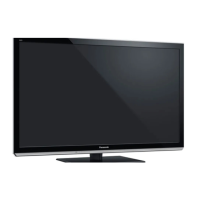
